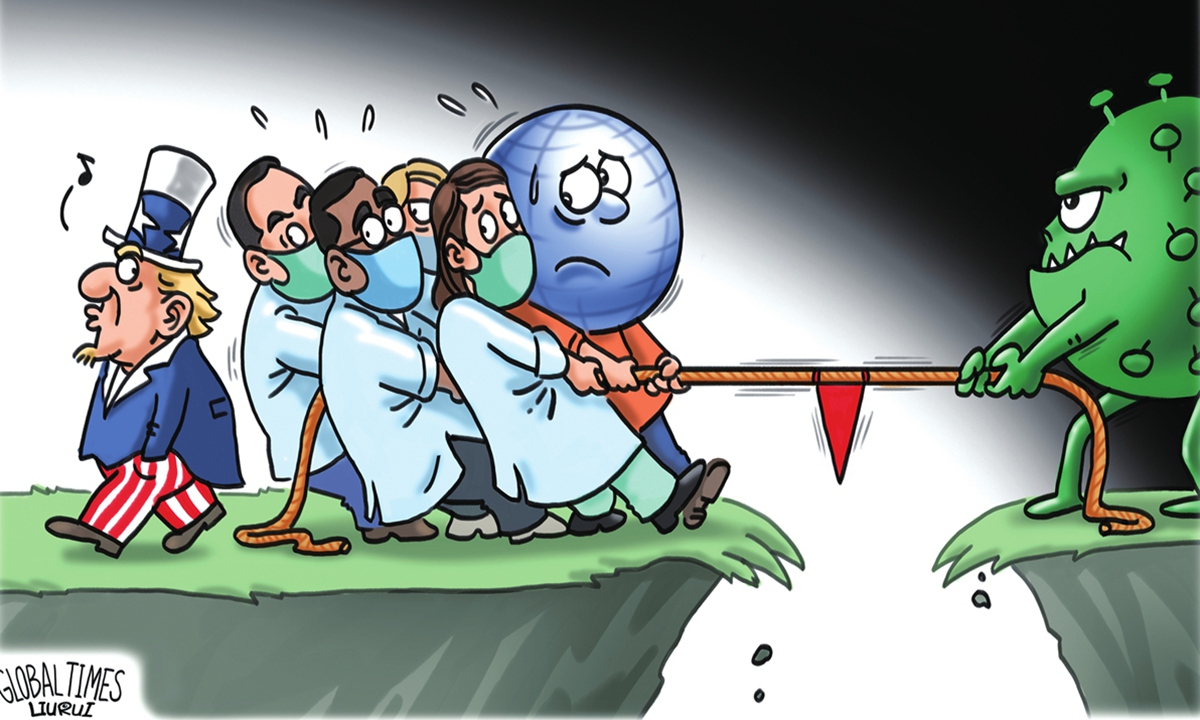
Illustration: Liu Rui/GT
The rapid global spread of the Omicron strain has delayed the end of the surging COVID-19 pandemic. The newly discovered heavily mutated variant is two to three times more infectious than the Delta strain, comparable to measles, and is rapidly becoming dominant. Its greater ability to evade antibodies not only increases the risk of re-infection, but also reduces the effectiveness of existing vaccines and even disables antibody drugs developed by US companies like Regeneron or Eli Lilly.
To reassure the public, US President Joe Biden claimed that the government has more tools to cope with the epidemic and the country is not "back to March 2020." However, the policies in Western countries, including the US, the UK and Japan, are "yesterday once more" with little progress. After the Omicron strain was first reported in South Africa, those countries quickly imposed a travel ban on it and its neighboring countries, which, despite criticism from the WHO, had little effect. As the number of infections within the developed world climbed rapidly and healthcare systems went into emergency, governments had to upgrade prevention policies and begin another round of vaccines and drug stockpiling.
The fast spread of the Omicron strain is a proof that it's ineffective to leave countries to issue their own restrictive measures within their borders despite the requirement of information sharing. The global health system must be redesigned to end the pandemic. Member states of the WHO, on the special session held on December 2021, considered developing a convention on pandemic preparedness and response, which should reconstruct the response system of the international community in at least the following ways:
First, countries should work together to combat the pandemic after an outbreak, rather than simply relying on issuing negative travel or trade bans. Since countries today are intertwined with each other in terms of transportation, border measures for one or several countries only have limited effects and short buffer times. A most effective way is to address it at the source in the early stage. Only by connecting the WHO's various alarm systems to international assistance and collective action will it be possible to change the fragmented situation. This requires a strengthened capability of WHO in order to establish linkage with the entire UN system, the G20, and other institutions such as the World Bank.
Second, the international public production capacity for critical protective materials, vaccines and drugs should be established. The COVID-19 Vaccines Global Access (COVAX) is a worldwide initiative aimed at equitable access to vaccines, especially for poor countries which cannot afford them. Although COVAX helped increase the bargaining power of international organizations over vaccine products, it was unable to solve the vaccines access issue. Rich countries still have greater purchasing power as well as a monopoly on intellectual property and production capacity to seize preemption. The paradox of the pandemic is the coexistence of massive vaccine waste in developed countries and the inability of low-income countries, together with the international agencies representing their interests, to access vaccines.
To solve this problem, the international community should no longer rely on a few multinational pharmaceutical giants to produce vaccines and drugs, benefiting their corporate profit and stock price with public funds. Instead, the international community should invest capital and technology in developing countries to establish international public production capacity that meets WHO production standards. It should meet local needs normally while prioritizing or guaranteeing supplies to international organizations in public health crises.
Third, the responsibilities and obligations of individuals during a pandemic response should be emphasized. Public health experts stressed that many of the severe illnesses and even deaths were "preventable" amid the outbreak of the Omicron variant. With an adequate supply of vaccines, there are still large amounts of people refusing to be vaccinated. Those choices by individuals have an impact on the entire society, especially with many seriously ill patients in the healthcare system. Moreover, the failure of governance within major powers could shock the international order. As a result, the new international convention should not only protect individual freedoms, but also promote their responsibility for others, societies and the human community as a whole.
The author is executive director of BRICS Research Center, Shanghai International Studies University. opinion@globaltimes.com.cn




